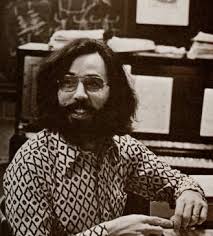So What

Don Funes, who made teaching an art.
Some Indian classical music people listen to what I do and think, "That's not what we do." Some jazz people listen to what I do and think, "That's not what we do." Some computer music people listen to what I do and think, "That's not what we do." Some electronic music people listen to what I do and think, "That's not what we do." Some contemporary classical music people listen to what I do and think, "That's not what we do." So what. Elliot del Borgo arranged for Don Funes to give me private composition lessons for a full semester, something he had never done before, at least formally, while at the Crane School of Music, and I don't believe he ever did this again with anyone else while there. Those lessons were transformative. Right now, as I think of it, I see him sitting there in front of me, filling his office room with intelligence, creativity and love. Don almost knocked me out of my chair one day, commenting related to my music: "That's part of your genius." Don't really know if he was referring to the genius we all have inside of us, and said things like this to all his students, or if he was indicating there was something special about myself - I never asked him about that. For the record, another essential teacher said something similar, as have a number of others. My early piano teacher, Barney Bragin, also a fantastically creative teacher who introduced me to the Bach Inventions and Jazz Themes From Eurasia by The Dave Brubeck Quartet, was the first to voice this opinion, marveling at a pattern I invented at the piano. Bragin was so excited by what I played he even called his son, who was a brass musician, to come join us immediately to hear it. Leonard Altman made me feel like I was the most important composer in the world - no doubt, he made all his composer friends feel this way - and took the extraordinary action of asking Steve Reich to be my compositional mentor after I found graduate school a creative nightmare, more like an assembly line factory, the complete opposite of Don Funes.
Michael Robinson while an undergraduate. A teacher's thoughts about Michael's long auburn hair.
Don also told me he didn't understand the definition of quality I came up with for one assignment in an electronic music class he taught: "Quality is epiphany illuminated by a jewel of the lotus." So, I explained how the lotus represents the world and the jewel represents the individual. Here are my 2019 compositions for you, Don. I know you would have loved how I took elements of jazz and Indian classical music and European classical music and rock-pop to make something new. Hope you have a chance to listen in The Forest of Brinda or wherever you are. Not sure if you have audio on your motorcycle!
Some people get hung-up by my use of the Meruvina, essentially a computer, not understanding as Joe Zawinul did that the instrument really isn't the point because its always the person behind the instrument that matters. Louis Armstrong said something similar noting how all music was folk music because horses don't make music. One astute observer, Alejandro Cohen, noted how Frank Zappa came to favor this method even though our respective music is worlds apart. Who would have guessed that the words of Stan Getz would be as timeless as his music? “There are four qualities essential to a great jazzman. They are taste, courage, individuality, and irreverence. These are the qualities I want to retain in my music.” - Stan Getz Pretty sure Don would have concurred with these thoughts applying to composers, too. - Michael Robinson, December 2019, Los Angeles
© 2019 Michael Robinson All rights reserved
Michael Robinson is a Los Angeles-based composer, programmer, pianist and musicologist. His 199 albums include 152 albums for meruvina and 47 albums of piano improvisations. Robinson has been a lecturer at UCLA, Bard College and California State University Long Beach and Dominguez Hills.
|